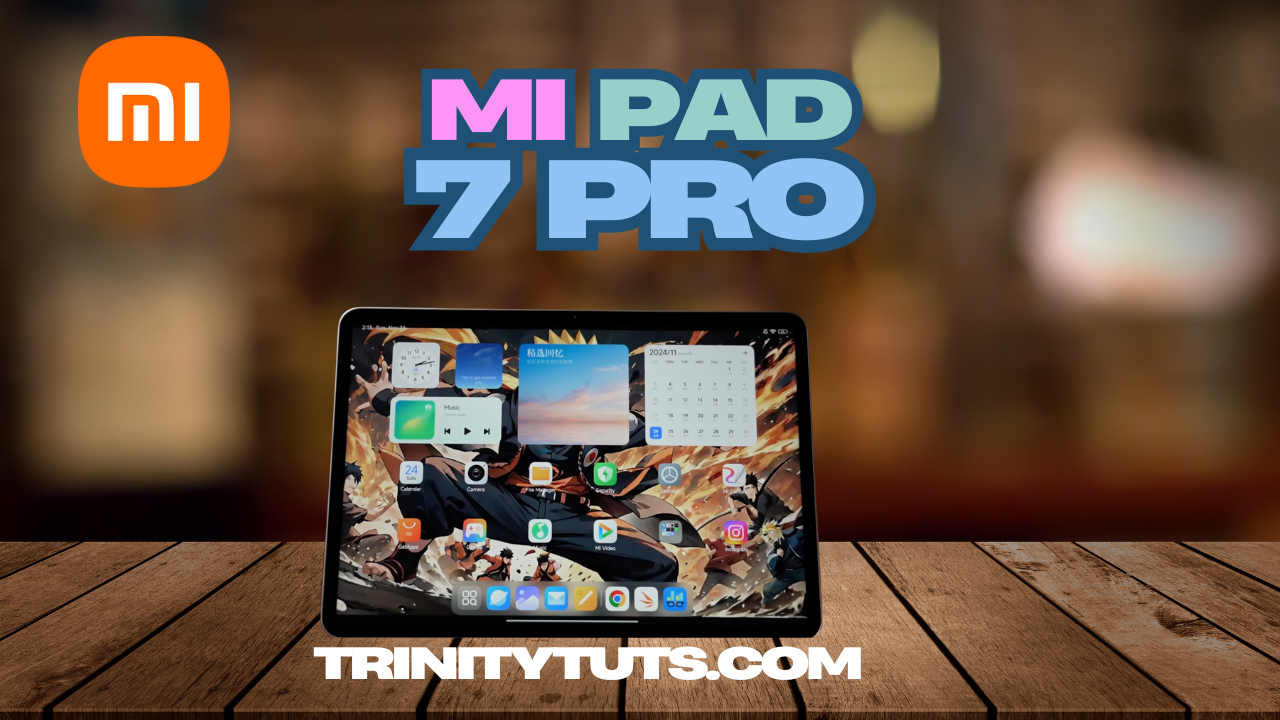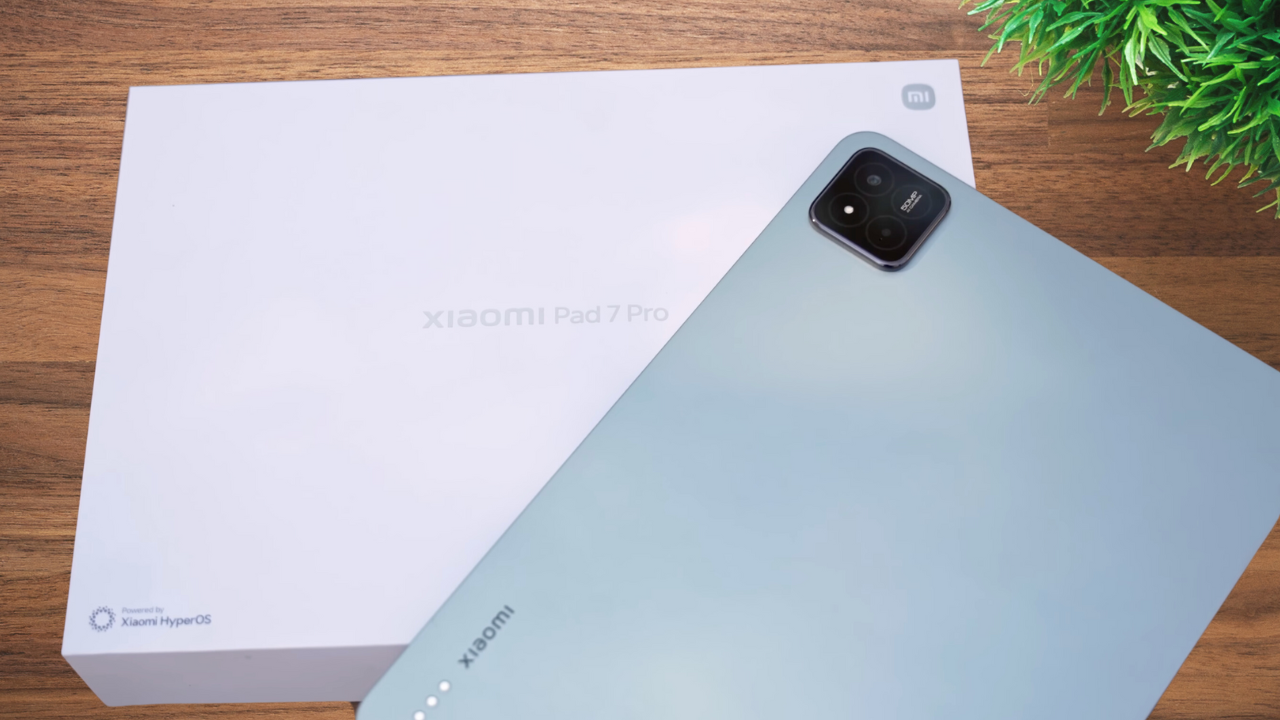Xiaomi Pad 7 Pro Launching in India on 10th January 2025: Specs, Price, and Features
SWATI BARWAL
. 4 min read
Xiaomi Pad 7 Pro: A Closer Look at Xiaomi's New Flagship Tablet
Xiaomi has unveiled its latest flagship tablet, the Xiaomi Pad 7 Pro, and it seems like a solid upgrade in many aspects. The device boasts a large high-resolution display, impressive battery life with fast charging, and a more affordable price—25% lower than its predecessor, the Pad 6S Pro. However, as good as it looks on paper, the Pad 7 Pro raises questions about its target audience and purpose. Let’s dive into the details to explore its features and potential drawbacks.

Box Contents of the Xiaomi Pad 7 Pro
The box includes:
Xiaomi Pad 7 Pro wrapped in a protective cover.
67W charger for fast charging.
USB Type-A to Type-C cable.
Quick start guide for easy setup.
Notably, there’s no SIM tool or microSD card slot included, as the Pad 7 Pro does not support cellular connectivity or expandable storage—consistent with Xiaomi's recent tablet offerings.
Specifications of the Xiaomi Pad 7 Pro
Feature | Details |
|---|---|
Display | 11.2-inch 3:2 aspect ratio, 12-bit 3.2K resolution, 344 PPI, 144Hz refresh rate, HDR10+, Dolby Vision |
Processor | Snapdragon 8S Gen 3 |
RAM and Storage | 8GB/12GB LPDDR5X RAM, 128GB/256GB/512GB UFS 3.1 or 4.0 storage |
Operating System | HyperOS 2 based on Android 15 |
Audio | Four speakers with Dolby Atmos and custom equalizer |
Cameras | 50MP rear camera, 32MP front camera |
Battery | 8850mAh with 67W fast charging (full charge in ~1 hour) |
Build | 6.2mm thickness, over 500g weight, metal body |
Connectivity | USB-C 3.2 (supports video mirroring only), no cellular or microSD support |
Additional Features | 2D Face Unlock, fingerprint scanner in the power button |
Display: A Big Upgrade with Some Trade-Offs
The Xiaomi Pad 7 Pro comes with an 11.2-inch 3:2 aspect ratio display, offering 12% more screen real estate compared to the 16:10 panel on the Pad 6 Pro.
Pros:
Great for reading and multitasking: The wider screen in portrait mode makes browsing, reading books, and viewing comics more enjoyable. In landscape mode, the aspect ratio supports efficient multitasking, allowing two apps to run side by side.
High resolution and refresh rate: The display is a 12-bit 3.2K panel with a sharp pixel density of 344 PPI and a smooth 144Hz refresh rate.
Improved brightness: With 600 nits in manual mode and 800 nits in auto mode, the screen performs well even in bright conditions.
HDR support: It supports HDR10+ and Dolby Vision, enhancing video playback quality.
Cons:
Black bars during video playback: The 3:2 aspect ratio leads to noticeable black bars when watching content in 16:9 or 21:9 formats.
No OLED panel: While the IPS LCD offers good contrast, it lacks the deep blacks of OLED displays.
Audio and Multimedia
The Pad 7 Pro features four Dolby Atmos-enabled speakers that deliver rich and immersive sound. Xiaomi also offers a custom equalizer for fine-tuning the audio experience. Paired with the excellent display, this makes the tablet a solid choice for multimedia consumption.
Performance and Software
Under the hood, the Pad 7 Pro is powered by the Snapdragon 8S Gen 3 chipset, paired with up to 12GB of LPDDR5X RAM and 512GB of UFS 4.0 storage. It runs on Xiaomi’s HyperOS 2, based on Android 15, which brings:
Enhanced multitasking: Features like floating windows, split-screen mode, and workstation mode make it easy to manage multiple apps.
Responsive interface: The animations are smooth, and the tablet handles heavy tasks and games with ease.
However, the USB-C port, despite being USB 3.2, only supports display mirroring, limiting its versatility for external displays.
Battery and Build
The Pad 7 Pro houses an 8850mAh battery, providing excellent longevity. The included 67W charger can fully charge the device in about an hour. Despite the larger battery, the tablet is slim at 6.2mm and weighs just over 500g, making it comfortable to hold.
Cameras
The tablet has a 50MP rear camera and a 32MP front camera. While these cameras aren’t groundbreaking, they perform well for basic tasks like document scanning and video calls.
Price and Launch Date in India
The Xiaomi Pad 7 Pro is set to launch in India on 10th January 2025. In China, the starting price is ¥2,499, approximately ₹28,500, but Indian pricing may vary due to taxes. It is expected to range between ₹28,000 and ₹32,000, depending on the variant.

Final Thoughts
The Xiaomi Pad 7 Pro offers a compelling package, but it also comes with some compromises. Its price is lower than its predecessor, but it lacks certain premium features. For those looking for peak performance, alternatives like the OnePlus Pad 2 may make more sense. On the other hand, the standard Pad 7 delivers similar features at a lower price, making the Pro version's niche unclear.
If Xiaomi decides to launch this tablet in India, it will be interesting to see how it stacks up against competitors in the mid-range tablet segment.
More Stories from
🚀 OpenAI’s $3 Billion Windsurf Acquisition: What It Really Means
OpenAI's $3 billion Windsurf deal shows that developer tools—not chatbots—are the real future of AI. Here’s what this means for coders, jobs, and the evolving dev landscape.
10 Most In-Demand SEO Services to Focus on in 2025
Stay ahead of the curve with the 9 most effective SEO services for 2025. From local SEO to content optimization and E-A-T strategies, these essential services will ensure your website ranks higher and drives more traffic.
Boost Developer Speed with Google Cloud CLI & Claude AI
Accelerate software development with Google Cloud CLI and Claude AI. Automate tasks, deploy faster, and improve workflows using intelligent tools.
India’s Rise in the AI Era: Shaping the Future as a Global Leader
India is becoming a global AI leader through initiatives like IndiaAI, indigenous LLMs like Sarvam AI and BharatGPT, and rapid startup growth. Learn how AI is shaping India’s digital and inclusive future.
AI and Beginner Developers: A Double-Edged Sword in Programming
AI tools are transforming how beginner developers learn to code. Discover the benefits, risks of over-reliance, and best practices to use AI effectively in your programming journey.






